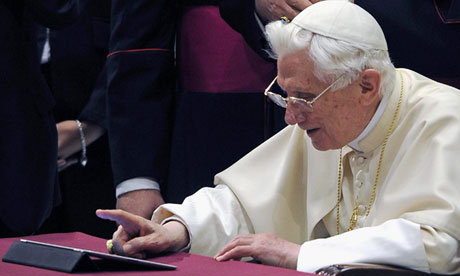 This morning the Holy Father began his personal tweeting under the handle @Pontifex. (The word is from one of the traditional titles, in Latin, of the pope, Pontifex Maximus, meaning, more or less, Great Bridge Builder.) Together the first three papal tweets read: "Dear friends, I am pleased to get in touch with you through Twitter. Thank you for your generous response. I bless all of you from my heart. How can we celebrate the Year of Faith better in our daily lives? By speaking with Jesus in prayer, listening to what he tells you in the Gospel and looking for him in those in need."
This morning the Holy Father began his personal tweeting under the handle @Pontifex. (The word is from one of the traditional titles, in Latin, of the pope, Pontifex Maximus, meaning, more or less, Great Bridge Builder.) Together the first three papal tweets read: "Dear friends, I am pleased to get in touch with you through Twitter. Thank you for your generous response. I bless all of you from my heart. How can we celebrate the Year of Faith better in our daily lives? By speaking with Jesus in prayer, listening to what he tells you in the Gospel and looking for him in those in need."
Lovely tweets. And admirable in their simplicity. The pope, a gifted communicator and brilliant theologian, is at his best when speaking to the faithful about the most central parts of our faith: Jesus, prayer, the poor.
While people frequently mock Twitter for its rigid rules on brevity (only 140 characters can fit into a tweet) there is something salutary about forcing oneself to be brief. It’s also difficult. (Believe me, I know: I tweet out daily homilies @JamesMartinSJ, which a friend of mine calls “twomilies.”) On the other hand, most of the Beatitudes could comfortably fit into a tweet.
A few hours later, Pope Benedict answered the first question for the day. Questions posed to the pope are being collected under #AskPontifex: "How can faith in Jesus be lived in a world without hope? We can be certain that a believer is never alone. God is the solid rock upon which we build our lives and his love is always faithful." Again, a lovely answer, admirable in its brevity. Theology doesn't have to be verbose to be effective. Again, look at Jesus.
The pope’s joining the Twitterverse is another sign of the Vatican’s willingness to go “to the ends of the earth,” or in this case to the ends of the web, to spread the Good News. As I suggested a few months ago in Status Update, no medium should be beneath the church when it comes to spreading the Gospel. Jesus used every and all media available to reach people of his time--including simple stories about seeds and flowers, birds and fish. In the famous definition of the Scripture scholar C.H. Dodd, a parable is "a metaphor or simile drawn from nature or common life, arresting the hearer by its vividness or strangeness, and leaving the mind in sufficient doubt about its precise application to tease it into active thought.” Nature and everyday life--simple things to help listeners understand the Kingdom of God. And Jesus used these simple things in his parables, another medium in the same way that Twitter is a medium. It was not beneath Jesus to use these means to communicate with the people of his time. And if it wasn't beneath the Son of God to speak about the birds of the air, then we can surely tweet. Other Catholic tweeters seem to agree.
The old saw is that the Vatican thinks in centuries, not minutes, so the minute-by-minute communication of this millenium may strike some as antithetical to the church. But since the Second Vatican Council (at least) the church has seen itself as resolutely in (as opposed to against) the modern world. So it uses all the tools of the modern world to introduce people to Jesus. Technology has other benefits: it is enabling the church respond more quickly to current events; it’s giving it new ways of proclaiming the Gospel; and it’s helping Catholics stay in closer touch with one another, and with someone like the pope, who who centuries ago seemed far removed from the daily lives of everyday Catholics. Some of the most interesting tweets are the questions being asked to @Pontifex. There are of course already some haters who have used @pontifex and posted some very nasty stuff in response, but that goes with the territory. (You should see the stuff people say to me on Twitter: it's probably just a matter of time before someone tells the pope he's not Catholic enough.)
Here is a video of the “Primo tweet del Papa.” For the record, after I tweet no one applauds or waits around to kiss my hand. Normally, that is.







